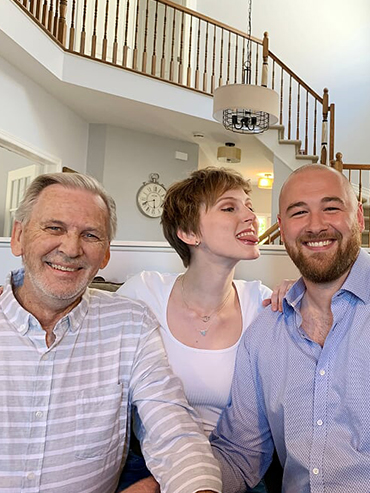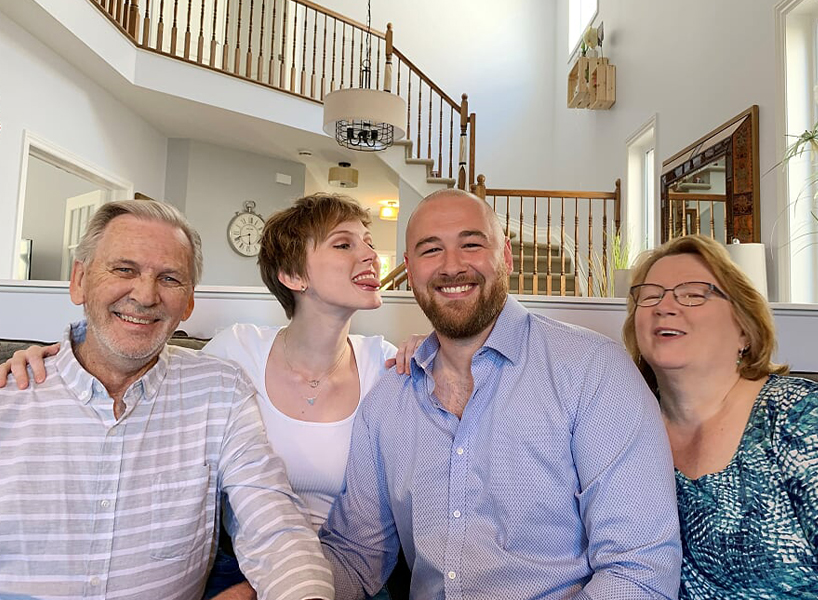My Boyfriend and I Couldn’t Afford Rent on Our Own…So We Asked My Parents to Move In
As home ownership feels increasingly out of reach, one millennial couple came up with a novel solution


It’s a late-July Sunday morning, and my boyfriend, Steve, has just served my mom and me his fluffy scrambled eggs for breakfast. This is the first time she is going to experience them (trust me, they’re an experience), and I can’t wait to devour them. My dad, on the other hand, hates eggs, so he’s working his way through a stack of toast with raspberry jam. In between bites, we discuss ideas on what to do with two of the rooms in our house that we’ve left empty. (Consensus: a guest room and a walk-in closet.)
Breakfast finishes, and my mom thanks Steve for the eggs but says with a chuckle that they must be heading home now. Cue sarcastic laughs from Steve and me, because my parents have only to walk down a flight of stairs to go “home”: They live in the nanny suite in our basement.
Living with your parents as a 29-year-old is a prospect many millennials would shudder at, but it has become my (and my boyfriend’s) reality as of this summer.
I know what you might be thinking: Oh, great, another lazy millennial mooching off their parents. Except you’d be wrong. Because I’m not living with my parents—my parents are living with me.
Canadian millennials can’t afford to be as independent as their predecessors
Late last year, Steve, who’s 30, and I had been dating for several months and wanted to take the next step in our relationship and move in together. The problem was, however, that we struggled to afford it—a decent place wasn’t going to be cheap, even where we live in Ottawa. We talked through some ideas on how to make it work, and that’s when Steve suggested we ask my parents if they’d be interested in moving in with us. We all get along very well and they had been talking about downsizing anyway, so it seemed like a good solution.
My parents—Cyndi, 56, and Bob, 62—loved the idea, so we started looking right away. We got lucky: The first house we saw had a layout that worked for all of us, so Steve and I signed a two-year lease and the house was ours.
It’s a relatively unusual solution (in Canada, at least) to an increasingly common problem: Millennials can’t afford to permanently leave home and gain independence by their early 20s like previous generations could. Instead, according to a 2017 Pew Research poll, monumental student-loan debt and rapidly rising housing prices are causing a “boomerang effect,” where millennials who’ve previously fled the nest return home to live with their parents.
The average Canadian post-secondary student will owe between $14,900 and $26,300 in student loans upon graduation, according to Statistics Canada. And it takes a typical millennial 13 years of full-time work to save a 20% down payment on an average-priced home, reports Generation Squeeze (a non-profit advocate for young Canadians).
As of 2017, 24% of millennial men and 19% of millennial women live with at least one parent—an almost two-fold increase since 1995. This, Statistics Canada says, is likely partly because 12% of adults living with their parents attended a post-secondary institution.
But I’m not a student—I’m a 29-year-old professional who has worked as a full-time journalist for more than six years. At the moment, I have three jobs: I’m a part-time professor at an Ottawa college, a freelance writer and an editor for a local neighbourhood magazine, and I gross about $60,000 a year. Despite my income being 35% higher than the average annual earnings for my age group (25 to 34), it isn’t enough to allow me to meet both my financial needs and save for a down payment. Generation Squeeze estimates that I’d actually need to earn at least $93,000 a year to be financially independent and own a home.
Why sharing a home with my parents makes sense for us
The past few years were not kind to my or Steve’s finances. I had a full-time job at a well-known newsroom in Toronto for two years, but my salary was barely enough to cover basic expenses. Inevitably, my savings dried up and I was forced to move back home with my parents last year. Steve, who’s a carpenter, was pushed to do the same after a business venture to flip a house resulted in only a small return. Now we have a chance to really save.
Another factor was my parents’ ages and health. Several years ago, my mom was diagnosed with ankylosing spondylitis, a severe and painful form of arthritis that worsens over time, and I cannot expect my father (who has had several bouts of cancer in the past) to take care of her on his own as he nears retirement. Being close to them gives me peace of mind and allows me to help with my mom’s care.
My parents see this arrangement as a boost for their finances too as it gives them the opportunity to further pad their pockets for their retirement. (With the exception of a two-year blip in the ’90s, my parents were lifelong renters and instead invested their money through other avenues.)
But it’s not for everyone
We’re all happy with this living arrangement, but I’m not going to sugarcoat it—it isn’t for everyone. And for those it does work for, there might be a bumpy transitional period. It can be hard for parents to restrain themselves from “parenting,” and it can be all too easy to regress when you’re the “kid.” Figuring out new roles can take time.
As for drawbacks, privacy is the biggest one, but it has proven to be only a minor issue because we stay out of each other’s business. (Just recently, Steve and I had a passionate argument, and my parents heard everything.) Space hasn’t been a problem either because our house provides plenty of it, but this may not be the case for people who live in smaller quarters.
How we make it work
In order for this dynamic to work, we had to agree to a few details and rules. First, the rent and utilities would be split equally four ways (which works out to about $625 each for our four-bedroom, three-bathroom home with a nanny suite). Second, keeping the house clean would be everyone’s responsibility. Next, each couple promised to respect the other’s privacy. And, lastly, we would have to communicate openly, especially if any issues came up. We always try to be patient, considerate and compassionate with one another as well.
It also helps to have an open-minded approach. When Steve and I first discussed the idea, it felt almost taboo because it’s a notion that Western culture often scoffs at. But this type of living arrangement has been common in many Eastern societies for millennia, especially South Asian and Chinese cultures. This is partly because, according to a 2017 BBC article, Eastern cultures emphasize collectivism and place greater value on the group than on the individual while Westerners strive for individualism and place more significance on independence and personal choice. But times are changing, and maybe it’s time we do the same—or at the very least be open and accepting of different ways of doing things.
Looking to the future
Does this mean that our familial power dynamic has shifted? It has, but in a positive way. There’s no hierarchy in the household like there was when I was a kid because we’re all adults now who contribute equally to our home, and we all treat and respect each other as such.
At this point, we can see this being a long-term arrangement. As Steve and I prepare for marriage, we love the idea of my parents being around to help with our future kids. We’re both very family-oriented people, so this set-up is more of a plus in our books.
While it’s true that my parents are helping Steve and I alleviate some of the financial stresses that come with starting a life together, I also see this as an opportunity to help them as well. After all they’ve done for me throughout the years—supporting me in everything I do, helping me in times of need, being there throughout my own health struggles—I think it’s time I return the favour and take care of them a little. Life has come full circle for us and the roles have reversed—and everyone is better off for it.
Related:
The Millennial’s Guide to First-Time Property Buying (It’s Possible!!)
Canada’s Housing Crisis: 10 Millennials on What It’s Really Like
5 Millennial Women on How Much They Make and How They Spend It








